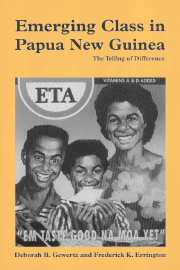Book contents
- Frontmatter
- Contents
- List of illustrations
- Acknowledgments
- Introduction: the twists and turns of difference
- 1 The middle class the (new) Melanesian way
- 2 How the grass roots became the poor
- 3 The realization of class exclusions
- 4 The hidden injuries of class
- 5 The problem(s) of the poor
- 6 Class and the definition of reasonability
- Conclusion: on dark nights of the soul
- Notes
- References
- Index
1 - The middle class the (new) Melanesian way
Published online by Cambridge University Press: 03 December 2009
- Frontmatter
- Contents
- List of illustrations
- Acknowledgments
- Introduction: the twists and turns of difference
- 1 The middle class the (new) Melanesian way
- 2 How the grass roots became the poor
- 3 The realization of class exclusions
- 4 The hidden injuries of class
- 5 The problem(s) of the poor
- 6 Class and the definition of reasonability
- Conclusion: on dark nights of the soul
- Notes
- References
- Index
Summary
The Wewak Rotary Club
We begin our talk about the emerging nature of class distinction in contemporary Papua New Guinea life with discussion of a particularly salient set of contexts and engagements for forging the redefinitions central to the happenings of class: for creating new inclusions and exclusions through which the connections and disconnections with past and present and with other Papua New Guineans were reformulated. Our focus is Wewak's Rotary Club. A thoroughly middle-class, capitalist-based organization both in its American inception and its Papua New Guinean manifestation, Rotary facilitated efforts by members of Wewak's middle class to create and consolidate their new identities and interests. To understand this context of redefinition – of class happenings – we will explore what Rotary International, both as organizational form and ideology, brought with it to Papua New Guinea, what it has encountered there, and what it has produced.
The inception of Rotary as a middle-class institution
Rotary's worldwide career began in the United States in the early twentieth century. Its founder, Paul Harris, had come as a young lawyer to a Chicago characterized by daunting social anonymity and economic competition – features only exacerbated by the cut-throat impersonality of an increasingly powerful corporate capitalism. Harris, realizing that others, too, lacked both friends and business contacts, undertook in 1905 to create a fellowship of those pledged to aid each other in business. Believing that only noncompetitors (and one might add, class equals) could be friends, and sensing the advantage in having diverse business allies in what he hoped would be an economically fruitful network, he recruited for his club a single member (if possible, the most distinguished) from each of a range of occupations.
- Type
- Chapter
- Information
- Emerging Class in Papua New GuineaThe Telling of Difference, pp. 24 - 41Publisher: Cambridge University PressPrint publication year: 1999



